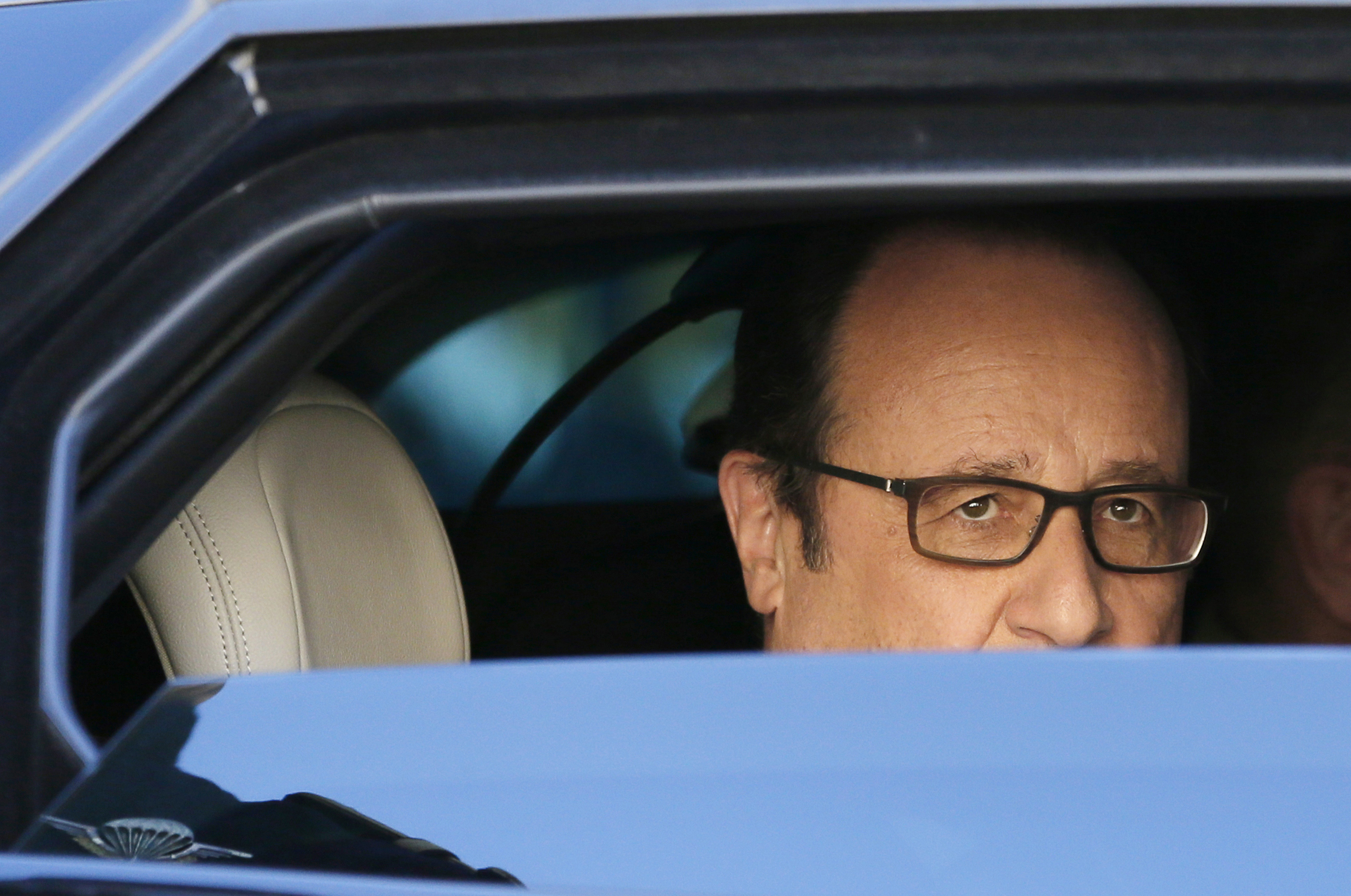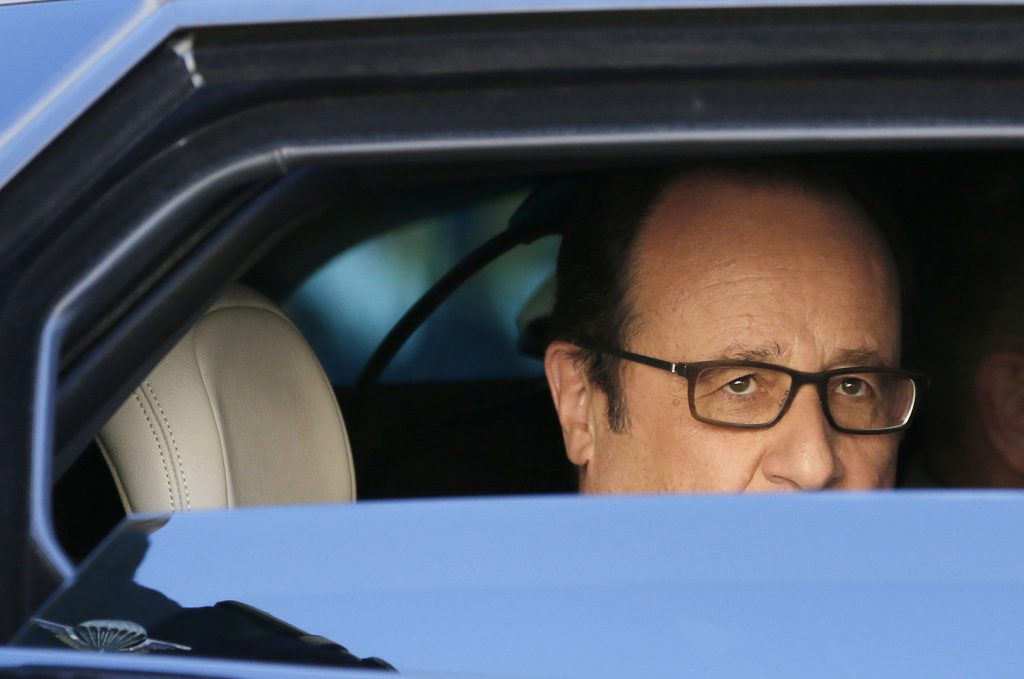 French President François Hollande went to Bamako, Mali, last week for the twenty-seventh Africa-France Summit, his last scheduled visit to Africa before he leaves office in May, having been forced to give up any hope of a second term by the most abysmal approval ratings of any head of state in this history of the Fifth Republic. Running for the presidency five years ago, Hollande included in his election manifesto, 60 Engagements pour la France, a promise to definitively break with “Françafrique,” the neocolonial pact between France and its former colonies, in favor of “a new relationship founded on equality, trust, and solidarity.” Given Africa’s rising geopolitical heft and burgeoning economic dynamism, the legacy the French leader actually leaves in the region—which has been a bright spot amid Hollande’s widespread unpopularity—is of significant import not only for Africans, but also for France, its European neighbors, and, indeed, the wider transatlantic community.
French President François Hollande went to Bamako, Mali, last week for the twenty-seventh Africa-France Summit, his last scheduled visit to Africa before he leaves office in May, having been forced to give up any hope of a second term by the most abysmal approval ratings of any head of state in this history of the Fifth Republic. Running for the presidency five years ago, Hollande included in his election manifesto, 60 Engagements pour la France, a promise to definitively break with “Françafrique,” the neocolonial pact between France and its former colonies, in favor of “a new relationship founded on equality, trust, and solidarity.” Given Africa’s rising geopolitical heft and burgeoning economic dynamism, the legacy the French leader actually leaves in the region—which has been a bright spot amid Hollande’s widespread unpopularity—is of significant import not only for Africans, but also for France, its European neighbors, and, indeed, the wider transatlantic community.
The venue and date of the summit, held 13-14 of January, were carefully selected to focus attention on what proved to be the high point of Hollande’s Africa policy, perhaps even of his foreign policy in general. The summit took place four years to the day from when French forces launched Operation Serval against al-Qaeda in the Islamic Maghreb and other jihadist groups that, availing themselves of the free flow of fighters and weapons unleashed on Africa by the collapse of Muammar Gaddafi’s Libya, had seized control of the northern two-thirds of Mali and threatened to overrun the rest of the country. The French-led intervention turned the tide and, in a triumphant speech delivered in the Malian capital on February 2, 2013, just three weeks after the start of the operation, Hollande declared it “the most important day of my political life.” Returning to Bamako last week, Hollande was welcomed by the summit’s co-chair, Malian President Ibrahim Boubacar Keïta, as “the most sincere and most loyal of all French heads of state in relation to Africa.” While Islamist militants operating across the Sahel still stage attacks in northern Mali, making the United Nations Multidimensional Integrated Stabilization Mission in Mali (MINUSMA) the most dangerous blue-helmeted deployment in the world in 2016, the country is certainly more than back from the brink. This idea was underscored by the gathering of dozens of heads of state and government. Moreover, French forces in the region, reorganized as Operation Barkhane, permanently headquartered in N’Djamena, capital of Chad, now carry out operations not only against Islamist insurgents in Mali, but also Burkina Faso, Chad, Mauritania, and Niger.
If the intervention in Mali was to prevent an Islamist victory, Operation Sangaris in the Central African Republic (CAR) at the end of 2013 was aimed at preventing a civil war that had taken on increasingly sectarian tones from degenerating further into genocide. Here the success for Hollande was more ambiguous. While responsibility for CAR’s security was turned over to a UN mission, presidential elections held, and the French operation wound down in October 2016, violence continues to intensify in the country and French soldiers were tarnished by allegations of child sex abuse (although judges in France recently declined to bring charges).
According to the French Agency for Development (AFD), Hollande has also largely delivered on the €20 billion aid package promised at the last Africa-France Summit in 2013 with €11.5 given between 2014 and 2016, and €4 billion annually expected to be disbursed this year and next. The French parliament’s decision in 2016 to double AFD’s budget means that the aid agency’s resources for Africa may increase by an additional 50 percent from 2020, with most of the new money going towards programs to mitigate the effects of climate change.
Perhaps not too surprising given his socialist provenance, Hollande’s economic engagement with Africa has been less successful aside from allocations for foreign aid. Even as Africa has had some of the fastest growing economies in the world in recent years, France’s share of the continent’s trade volume has slipped over the last decade from 8.7 percent to 5.6 percent. In this respect, Hollande differed significantly from US President Barack Obama, who otherwise shared similar intellectual roots in leftist politics but whose most significant Africa policy achievement may well be helping to shift Americans’ view of the continent to embrace its many business opportunities, not least through showcasing them at two US-Africa Business Summits. In contrast, last month the head of MEDEF, the main French business confederation, lamented that the Bamako meeting was “above all a political summit,” while insisting “we need to have an economic summit.” Singling out two former French colonies with buoyant economic prospects, Pierre Gattaz noted, “Our delegation of businessmen and executives would have preferred to go to Senegal or, even better, Côte d’Ivoire, where business is good right now. The choice of Bamako was the result of a political—and not economic—decision.”
With Hollande now a lame duck, the implementation of the Africa-France Summit’s Final Declaration, with its ambitious agenda ranging from concrete commitments for security assistance (e.g., France will train at least 20,000 African military personnel each year) and economic development (e.g., the promise of €10 billion in funding for 10 gigawatts of power) to more vague promises of increased cooperation on migration and cultural exchanges, will fall to his successor. The French Socialist Party and its Radical Left ally will hold the first round of presidential primaries on January 22 to choose a candidate to face off against the French Republicans’ nominee, former Prime Minister François Fillon, and the far-right National Front’s Marine Le Pen. Yet France’s Africa policy has a tradition of broad continuity, notwithstanding changes in government, and, among the leading contenders to succeed Hollande, Fillon in particular has a deep sensibility for affairs on the continent. In 2013, he gave a keynote address at an event organized by the Atlantic Council’s Africa Center calling for a deeper Franco-American partnership on African security challenges. How the next French president manages his country’s relationship with African states and peoples will be of not insignificant interest to President-elect Donald Trump, who assumes office this week. For this new administration, Africa presents considerable opportunities as well as challenges.
J. Peter Pham is Vice President of the Atlantic Council and Director of its Africa Center. Follow the Africa Center on Twitter @ACAfricaCenter.
Image: French President François Hollande peers out of his car as he arrives at the Hotel des Invalides in Paris April 15. In response to criticism of new surveillance rules, Hollande has asked the Constitutional Council, which rules on the constitutionality of laws, to review the legislation’s text. (Reuters/Patrick Kovarik)
